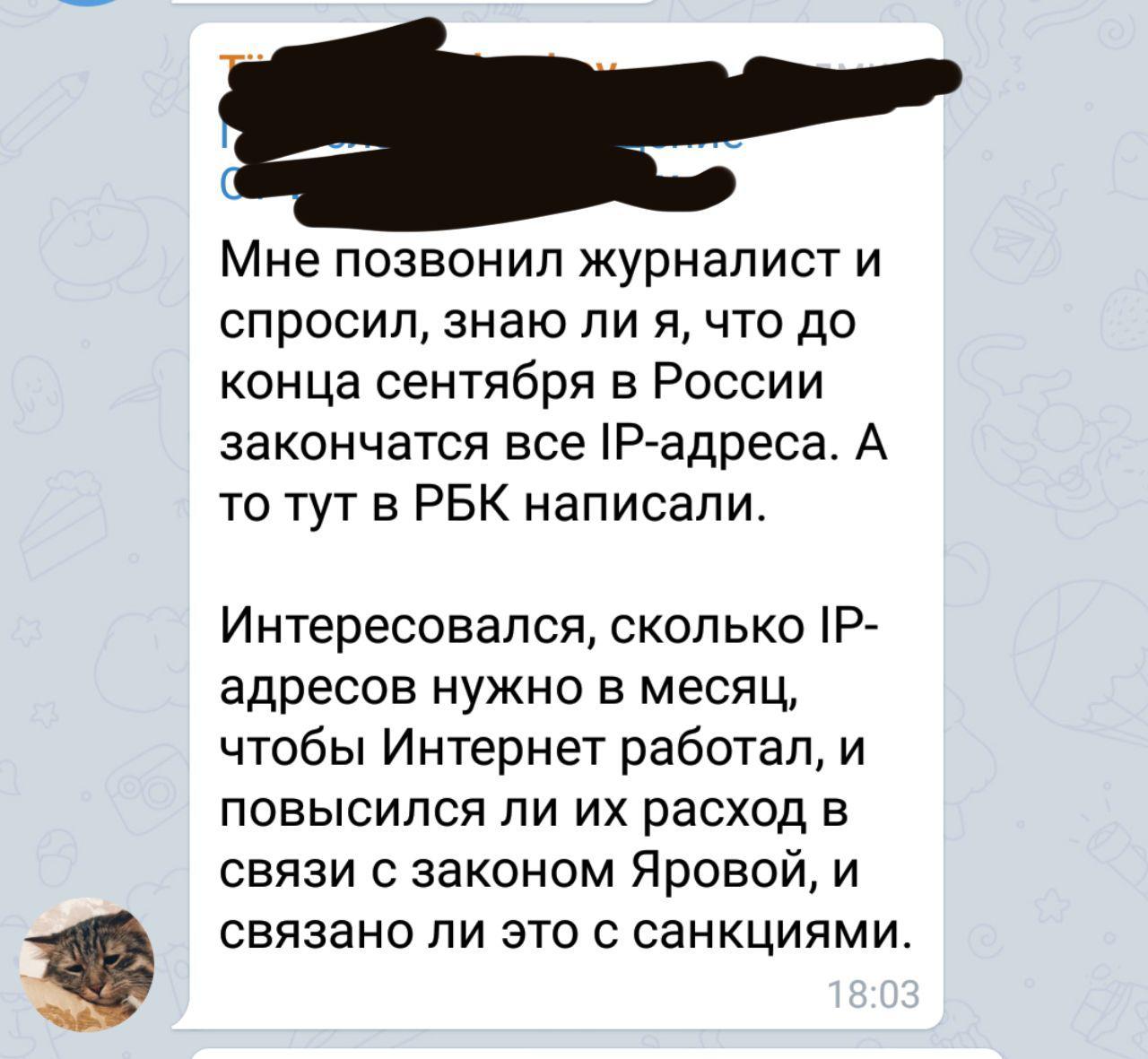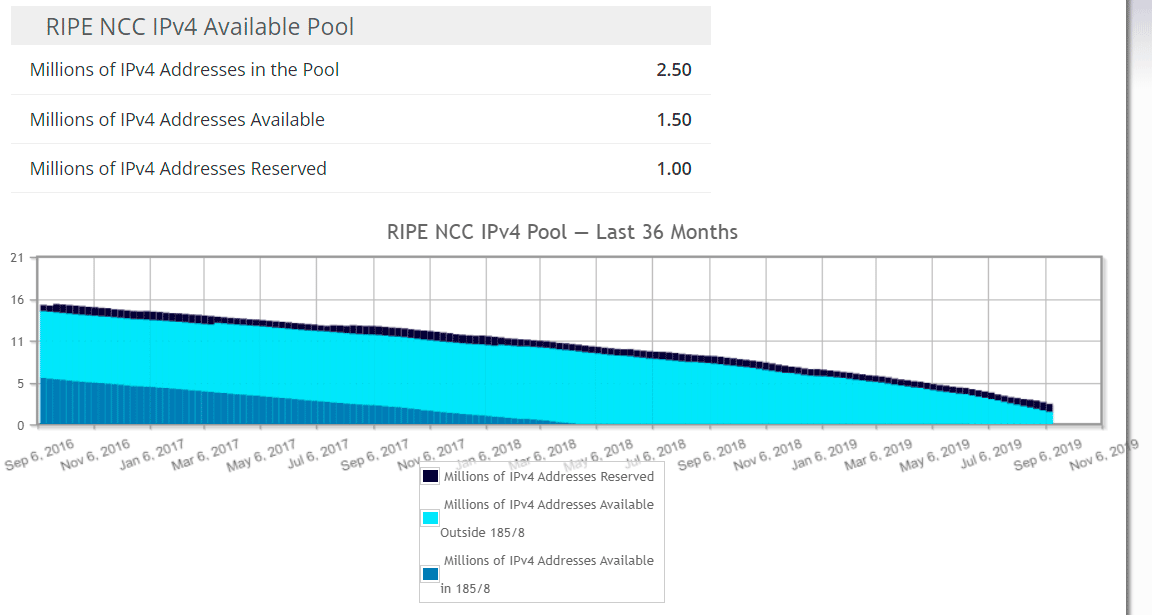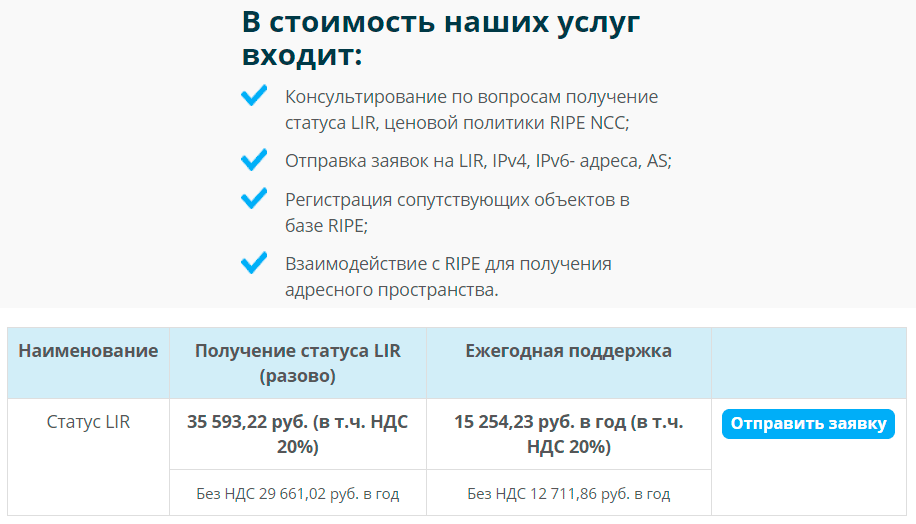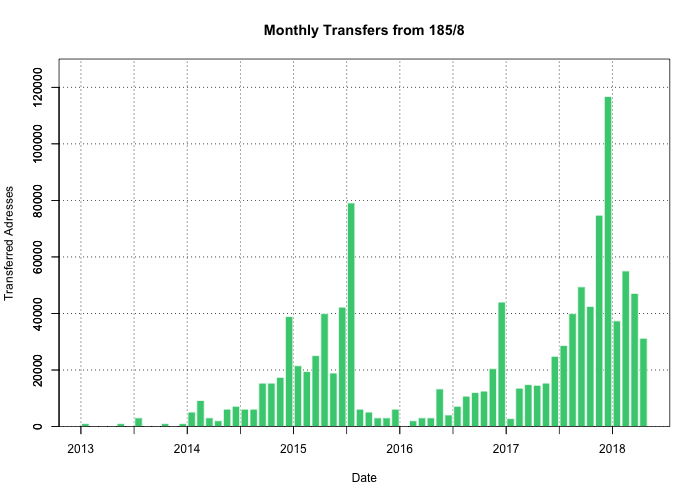The media raised a panic that "IP addresses are running out in Russia." How really?

IPv4 Address Space Allocation (Left) and IPv6 (Right) April 2018
Last week, the article “IP addresses will end in Russia by the end of September” in RBC (123,000 views) made a lot of noise, which was then picked up by other media .
In fact, there is no reason to panic. In short:
- It is only about IPv4 addresses (IPv6 addresses are quite enough, see the right side of the KDPV).
- RIPE NCC has a shortage of IPv4 addresses not only in Russia, but in the entire registry region.
- Everyone has long been accustomed to living in conditions of scarcity.
- If absolutely necessary, IPv4 addresses can be bought on the free market.
- Ordinary users will not notice the difference, this is the problem of providers.
Further on the items.
The article in RBC is based on an interview with Alexei Semenyaka, Director of External Relations in Eastern Europe and Central Asia, RIPE Network Coordination Center (RIPE NCC). He told everything correctly, but the journalists distorted the facts a little, starting with the headline.
Alex Semenyaka then apologized: “You inform the journalist. And then the article, in fact, is rewritten by the editor. In RBC, I talked with a girl who had given herself the trouble to sort things out some time ago, so even in the first proofreading there were few mistakes. But we honestly brought the text to a competent state, and she handed it to the editor of RBC. The result has already been seen. "
And this was only the beginning, then the topic went further .

The system administrator Habra Vadim Rybalko and Victor Ostashev (vvadmin.ru) helped us to understand the situation. We also read Alexey Semenyaki’s explanations for the ENOG public community.
Who allocates IP addresses?
The worldwide address space is globally managed by the American non-profit organization IANA, as well as five Regional Internet Registrars (RIRs). They allocate IP addresses to end users in certain territories and to local Internet registries (LIRs), such as Internet service providers.
RIPE NCC (French Réseaux IP Européens + English Network Coordination Center) is one of five RIRs for Europe, the Middle East and Central Asia.
“Addresses are distributed along the IANA-> RIR-> LIR [-> End User] chain. There are no countries in this chain, respectively, and there is no country piggy bank either. There are Russian LIRs that have a piggy bank, yes, ”explains Alexei Semenyaka. “The situation is common for all 76 countries of the RIPE NCC region, and not separately for Russia.”
IPv4 uses 32-bit (four-byte) addresses, limiting the address space of 4,294,967,296 ( 2,232 ) to possible unique addresses. “When the Internet was created, 4 billion seemed like a huge amount,” says Viktor Ostashev. - And as the network developed, it turned out that this was very small. The addresses did not end in Russia, but on the whole planet, so only absolutely illiterate people can talk about sanctions and the machinations of enemies. ”
IPv6 is a new version of Internet Protocol (IP) designed to solve the problem of address deficit. Here the address length is 128 bits instead of 32. The address space 2 128 (340 282 366 920 938 463 463 374 607 431 768 211 456 addresses) should be sufficient not only for computers, but also for all Internet of things devices on Earth and neighboring planets.
According to Google statistics as of September 16, 2019, the share of IPv6 in network traffic is about 25–29% .

Unfortunately, there remains a certain number of devices that do not support IPv6, and providers are forced to compete for addresses from a common IPv4 pool.
When did the IPv4 addresses end?
About exhaustion of IPv4 address space was repeatedly written on Habré.
In February 2011, IANA allocated the last five remaining blocks / 8 from its address space to regional Internet registrars. The first they ended in the Asia-Pacific region with the APNIC registrar ( April 19, 2011 ).
Then the turn of the others came.
On April 17, 2018, the European RIPE NCC Registrar distributed the last 1,024 IPv4 addresses from the last / 8 block received from IANA in 2011. Due to the breakdown into small blocks of 1024 addresses, the last / 8 was stretched for 5.5 years, while the previous block / 8 was distributed according to the old rules in five months.
Although the RIPE NCC allocated the last addresses from the last block, another 2.5 million addresses are left in the pool right now.

RIPE NCC filled the pool by conducting a roll call of organizations. According to the terms of the procedure , if no response was received from the owner, then the IP addresses were withdrawn from him.
How to get scarce addresses?
1. Register LIR
Local registrars solve the problem of scarce addresses in different ways.
According to statistics for 2012−2018, the speed of allocation of IPv4 addresses in Europe grew in accordance with the quadratic function. RIPE NCC attributes this to the fact that more and more local registrars have been registered. That is, if the provider or organization needed addresses, one of the options was to register with the RIPE NCC as a LIR and get the addresses almost for free (not counting the costs of registration ).

According to experts, for organizations, membership in the RIPE NCC was the cheapest way to get additional IPv4 addresses for their own infrastructure.
In November 2015, according to the results of the vote, the RIPE NCC prohibited the registration of additional LIRs by members of the RIPE NCC, but this did not help, so in May 2016 a decision was made by the community to remove this restriction. At this point, organizations began to register new legal entities in order to receive scarce blocks / 22. It is reported that a certain member of the RIPE NCC managed to get 66/22 blocks, although they issued only one for each local registrar. The reason for lifting the restriction was the decision that it is better to let organizations take advantage of a legal loophole in the current procedure, and not look for workarounds.
By 2015, RIPE NCC specialists realized that a large number of blocks / 22 immediately after allocation change their owner and within a few days or weeks transfer to another registrar (transfer). Then the members decided to ban the transfer of IPv4 addresses until 24 months after the allocation . But judging by the schedule of monthly transfers , this also did not help, it just froze the transfers of fresh ranges for two years.

2. Buying in the free market
Proposals for the sale or rental of IPv4 ranges are discussed in industry forums and on the Toaster . Leasing IPv4 addresses has become a kind of business.
“IPv4 addresses end in the pool of the Regional Internet Registry (RIPE NCC), and not“ in general, ”explains Alexei Semenyaka. - That is, the free market as it was, remains. New participants will not only have to become members of the RIPE NCC, but also buy IPv4 addresses on the market - as long as they need IPv4 addresses (I think their needs are unlikely to decrease in the next 3-5 years). That is, [after the address in the pool is exhausted], the entry threshold is increased ... RIR in North America no longer issues addresses. But they live as described above. True, $ 5,000 in the Russian Federation and in the USA is different money, in Russia the threshold increase will be felt more strongly. ”
Other solutions to the problem
In fact, the shortage of IPv4 addresses does not create special problems for users (the media said that captcha will be shown to users more often). Providers have some difficulties, but they also learned to cope with the shortage of address space. Many have learned Address Translation (NAT) when private IPv4 addresses are allocated to users (sometimes it happens in IPv6, but it’s exotic in general), and fewer global IPv4 addresses are used.
“In general, now, and so on, all ordinary users are sitting at dense NAT pools,” explains Vadim Rybalko. - It’s difficult to enlarge them, something is unlikely to change much here. The story of captcha is generally dubious, since these mechanisms are closed and it is not always clear what they are responding to. This is generally the least necessary to be guided by, as commercial Internet giants pursue their interests by independently choosing tools. And it’s in their interests to improve them so that the failure rate is minimal for legitimate users. ”
Alexey Semenyaka discusses the problem with captcha: “Operators will gradually increase re-subscription to CGNAT, of course. But captcha also needs infected computers, in fact, which CF or Google will detect, and the infection density is the second factor, and it is unclear how it changes over time. Here Google / Yandex / Bing Maps will be loaded a little bit worse, because there the squares are pumped out with separate connections. ”
But in the future, the main way to solve the IPv4 deficit problem is to switch to IPv6. There are no unsolvable technical problems here, you just need to encourage providers to do this, which ICANN and RIPE are doing. Unfortunately, it’s often easier for ISPs to build “crutches” for the existing IPv4 infrastructure than for drastic migration: “Until now, the transition to IPv6 has been hindered mainly by the reluctance of Internet providers to do anything,” confirms Viktor Ostashev. - The transition to IPv6 addressing requires changes to the billing systems of Internet providers and the replacement of a small amount of obsolete equipment. Without exception, all modern operating systems and all network equipment manufactured for at least the past 15 years are fully compatible with IPv6. As long as IPv4 was enough, providers had no incentive to switch to IPv6, and this restrains the spread of IPv6 in both website hosting and other applications, since IPv4 networks can access IPv6 addresses only through special proxies. The significant rise in price of IPv4 in the secondary market and the inability to obtain new IPv4 will be a significant incentive for the transition to IPv6. And those providers who do not switch to IPv6 will lose customers. ”
After the general transition to IPv6, IPv4 addressing as such will disappear, and with it the problem of address deficit will also disappear.
How will IPv4 scarcity affect users?
“End users will not be affected at all,” says Vadim Rybalko. - Advanced will notice, since most likely IPv6 will be more active in everyday life and you need to be able to use it. ISP and hosting sites have long been noticed. Potentially, at some point, it will be necessary to reconfigure the principles of allocating addresses to cloud providers in the mass market: the cost of the address is growing and becoming incompatible with the low-cost concept. Probably the hardest thing will be the hosting service providers. They have fewer NAT features. ”
In connection with state regulation attempts, we asked experts the following question:
- Do we need a special state initiative to adapt Russia's infrastructure to IPv6?
Vadim Rybalko : No way. Any state initiative will end in a senseless repressive apparatus. For sure, you should not wait for help. The credit of trust from the state in the field of IT has been exhausted for a long time. If it is constructive: it is necessary to enable the industry itself to deal with its problems. Still managed. For example, in the ARIN region, several large IPv6 only networks have long been deployed precisely because of the exhaustion of the free IPv4 pool. One of the positive examples in the Russian Federation: the MTS operator has long introduced IPv6 for its users.
Alexei Semenyaka : I don’t think that direct regulation is good here, it hasn’t worked anywhere in the world (although it can work in Belarus, it seems like there is such a state initiative). On the other hand, it does not scale, there are only 25 LIR. To realize how IPv6 can be useful and to whom, and use indirect regulation to get this benefit - yes, the state may well.
Summarizing:
- The problem of exhaustion of IPv4 addresses has long been known and is not unique to Russia.
- It’s clear how to solve it. “The problem is spreading to the whole world: the address space is used all over the world. It’s more likely that this problem will even benefit - exhaustion of IPv4 addresses will accelerate the transition to IPv6 ”(Victor Ostashev).
- Ordinary users are unlikely to notice that the providers have a deficit of IPv4 addresses or he switched to IPv6 : “The services of dedicated IP addresses can go up in price, but these services are rarely used by anyone. ”Dedicated server rental services can also go up in price, but I’m not sure that server tenants can be considered ordinary users.” (Victor Ostashev).
The topic was discussed many times, and the current panic in the media about social networks was caused simply by the careless work of the RBC editor.
On this topic:
“Belarus became the first country where IPv6 support is enshrined in law”
All Articles